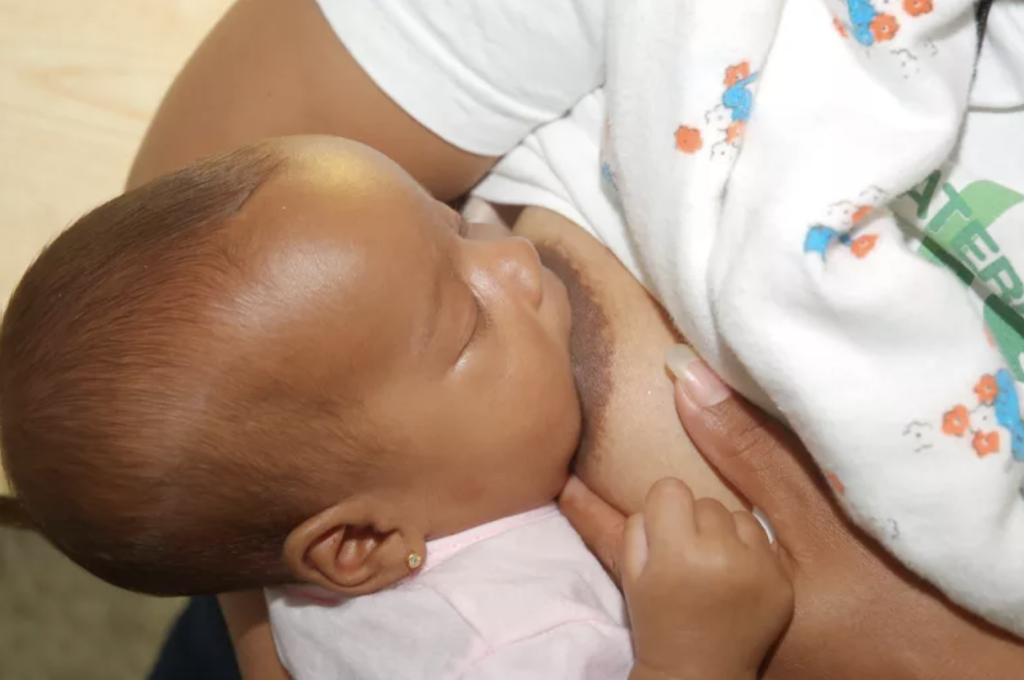
Breastfeeding is hard work, but its rewards are immense. But, as recent surveys show, it is not part of women’s child care culture in the Dominican Republic. Unicef, on occasion of the celebration of the World Breastfeeding Week from 1 to 7 August, highlights that only 1 of 10 mothers breastfeed their babies in the Dominican Republic.
Unicef urges more protection from commercial influence. The reality is that companies freely distribute formula samples to new mothers, breaking the impetus for breastfeeding that needs to start at birth in the hospital. Nurse availability or volunteers to teach breastfeeding to new mothers appears is much needed to instate breastfeeding from the start. More support from obstetricians and pediatricians is also needed.
According to Unicef, the Dominican Republic has one of the lowest exclusive breastfeeding rates in Latin America. Only 16% of babies under six months are breastfed exclusively, a number that plummets to 8% in some surveys. This is a far cry from the 48% global average and a stark reminder that what should be a collective commitment has become an individual challenge.
The World Breastfeeding Week, from 1-7 August 2025, serves as a crucial platform to remind the world that breastfeeding is a child’s right and a shared responsibility. The 2025 theme, “Prioritizing Breastfeeding: Creating Sustainable Support Systems,” highlights the urgent need to support young mothers in this endeavor.
Anyoli Sanabria, Unicef’s interim representative in the country, emphasizes this point: “Breastfeeding doesn’t just depend on a mother’s will; it depends on surrounding her with policies and systems that protect and support her. We need committed families, communities, workplaces, and health services. Every mother needs support, not judgment or barriers.”
Unicef explains that the low breastfeeding rates in the Dominican Republic are not just a matter of personal choice—they represent a significant public health and economic issue. Breast milk is a powerful defense against illness, packed with essential antibodies. According to Sanabria, if all children up to two years were optimally breastfed, nearly 600,000 infant lives could be saved each year globally. Beyond saving lives, breastfeeding reduces the risk of childhood obesity by 26% and offers lifelong protection against chronic diseases.
The lack of support for breastfeeding mothers comes at a steep price. The global cost of not breastfeeding is estimated to be billions of dollars in healthcare expenses and lost productivity. While a dollar invested in breastfeeding programs generates US$35 in economic benefits, funding remains woefully inadequate. Only 4% of countries receive the recommended minimum of US$5 per birth for these programs.
A call for action
Unicef is urging the government, businesses, and the public to take immediate action to reverse this trend. The organization’s key recommendations include:
• Increased funding: Boosting national and international funding for breastfeeding programs.
• Protection from commercial influence: Enforcing the International Code of Marketing of Breast-milk Substitutes to shield mothers from misleading commercial pressure.
• Strengthened healthcare: Training healthcare professionals in breastfeeding counseling.
• Expanded community support: Ensuring mothers have access to local counseling and support networks.
“Without sustainable support, millions of babies will continue to lose the chance at a healthier start to life,” Sanabria warns.
Read more in Spanish:
Unicef
6 August 2025

